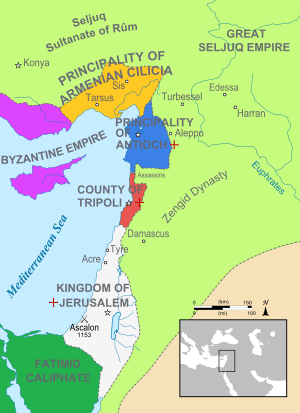Aimery of Cyprus facts for kids
Quick facts for kids Aimery |
|
|---|---|
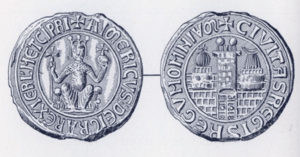
Aimery's seal as King of Cyprus and Jerusalem
|
|
| Lord of Cyprus | |
| Reign | 1194–1196 |
| Predecessor | Guy |
| King of Cyprus | |
| Reign | 1196–1205 |
| Coronation | September 1197 |
| Successor | Hugh I |
| King of Jerusalem together with Isabella I |
|
| Reign | 1198–1205 |
| Coronation | January 1198 |
| Predecessor | Isabella I |
| Successor | Isabella I |
| Born | c. 1153 |
| Died | 1 April 1205 (aged 51–52) |
| Spouse | Eschiva of Ibelin Isabella I of Jerusalem |
| Issue more... |
|
| House | Lusignan |
| Father | Hugh VIII of Lusignan |
| Mother | Burgundia of Rancon |
Aimery of Lusignan (born before 1155 – died April 1, 1205) was an important ruler in the Middle Ages. He became the first King of Cyprus in 1196. Later, he also became the King of Jerusalem in 1197, ruling both kingdoms until his death.
Aimery was a younger son of Hugh VIII of Lusignan, a nobleman from Poitou in France. He moved to the Holy Land after a rebellion in 1168. He married Eschiva of Ibelin, whose father was a powerful nobleman. This marriage helped him gain influence. His younger brother, Guy, married Sibylla, who was the sister of Baldwin IV of Jerusalem. Around 1180, King Baldwin made Aimery the constable of Jerusalem, a high military role.
Aimery was one of the leaders in the Battle of Hattin in 1187. This battle was a big defeat for the Christian army against Saladin's forces. After his brother Guy lost his claim to the Kingdom of Jerusalem, Aimery continued to support him. Aimery was even arrested for a short time by the new King of Jerusalem, Henry II of Champagne. After his release, he went to Jaffa.
When Guy died in 1194, the nobles in Cyprus chose Aimery as their new leader. He agreed to be under the rule of the Holy Roman Emperor, Henry VI. With the emperor's permission, Aimery was crowned King of Cyprus in September 1197. He then married Isabella I of Jerusalem, who was the queen of Jerusalem. Aimery and Isabella were crowned King and Queen of Jerusalem in January 1198. He made a peace agreement with Al-Adil I, the Ayyubid sultan of Egypt. This agreement protected the Christian lands along the coast from Acre to Antioch. His time as ruler brought peace and stability to both his kingdoms.
Contents
Early Life and Family
Aimery was born before 1155. He was the fifth son of Hugh VIII of Lusignan and his wife, Burgundia of Rancon. His family, the House of Lusignan, was known for its crusaders. His great-grandfather died in the Battle of Ramla in 1102. His grandfather took part in the Second Crusade. Aimery's father also went to the Holy Land and died in a Muslim prison.
Aimery joined a rebellion against Henry II of England in 1168, but the rebellion failed. Aimery then left for the Holy Land and settled in the Kingdom of Jerusalem. He was captured in a battle and held in Damascus. It is said that the King of Jerusalem, Amalric, personally paid for his release.
Aimery married Eschiva of Ibelin. Her father, Baldwin of Ibelin, was one of the most powerful noblemen in the Kingdom of Jerusalem. This marriage helped Aimery become an important person in the royal court.
Aimery's youngest brother, Guy, married Sibylla in 1180. Sibylla was the sister of King Baldwin IV of Jerusalem. Some stories say that Aimery helped arrange this marriage.
Aimery as Constable of Jerusalem
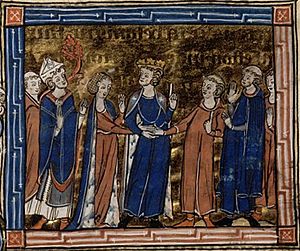
Aimery was first mentioned as the Constable of Jerusalem in 1182. This was a very important military position. Some historians believe he got this job earlier, around 1179 or 1181.
In 1183, Saladin, the Ayyubid sultan, attacked the Kingdom of Jerusalem. Aimery, with help from his father-in-law and brother, defeated some of Saladin's troops. This victory helped the crusader army advance. However, during this time, many nobles did not want to work with Aimery's brother, Guy. King Baldwin IV, who was ill, removed Guy as his heir. Instead, he made his five-year-old nephew, Baldwin V, his co-ruler.
King Baldwin IV died in 1185, and his nephew Baldwin V died in 1186. Despite an earlier decree, Sibylla was made queen by her supporters. She then crowned her husband, Guy, as king. Aimery supported his brother and sister-in-law.
As Constable, Aimery helped organize the army before the Battle of Hattin in 1187. This battle was a major loss for the Christians. Aimery and many other leaders were captured by Saladin. They were later released in 1188.
After Sibylla and her daughters died in 1190, many nobles believed Guy had lost his right to the throne of Jerusalem. But Aimery stayed loyal to his brother. Guy's opponents supported Conrad of Montferrat, who married Sibylla's half-sister, Isabella. Conrad was declared king in 1192, but he was murdered soon after. His widow, Isabella, then married Henry of Champagne, who became King of Jerusalem. To make up for losing Jerusalem, Guy was allowed to buy the island of Cyprus from the Knights Templar.
Aimery stayed in the Kingdom of Jerusalem, which was now a small strip of land along the coast. King Henry of Champagne had Aimery arrested for a short time. Aimery was released after the leaders of the Templars and Hospitallers demanded it. He then went to Jaffa, a land given to his older brother, Geoffrey of Lusignan.
Aimery's Reign
Becoming Lord of Cyprus
Guy died in May 1194. He left Cyprus to his older brother, Geoffrey, but Geoffrey had returned to France. So, Guy's nobles in Cyprus chose Aimery as their new lord. Aimery realized that Cyprus's treasury was almost empty. He convinced his vassals (nobles who held land from him) to give back some of their lands and income to help the kingdom.
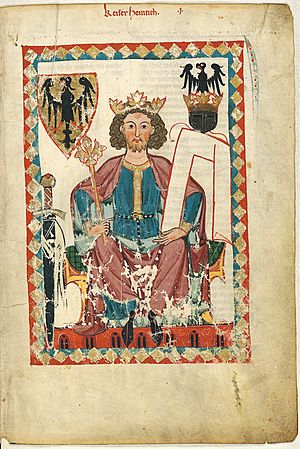
Aimery sent messengers to Pope Celestine III to ask for Catholic churches in Cyprus. He also sent a representative to the Holy Roman Emperor, Henry VI. Aimery offered to accept the emperor's rule if the emperor would send him a royal crown. Aimery wanted the emperor's help against any possible attack from the Byzantine Empire. He also wanted to make his rule stronger and more official. In 1196, Aimery's representative swore loyalty to Henry VI. The emperor, who was planning a crusade, promised to crown Aimery himself. He sent a golden sceptre to Aimery as a symbol of his right to rule Cyprus.
King of Cyprus
The emperor's envoys arrived in Cyprus in 1196. Aimery likely started using the title of king around this time. In December 1196, the Pope set up a Catholic archdiocese in Nicosia with three other bishops. The existing Greek Orthodox bishops were not removed, but their property was taken by the new Catholic leaders.
In September 1197, the emperor's chancellor, Conrad of Querfurt, crowned Aimery king in Nicosia. Aimery showed his respect to the chancellor. Nobles who owned land in both Cyprus and Jerusalem wanted to make peace between Aimery and Henry of Champagne. Henry of Champagne visited Cyprus, and the two kings made peace. They agreed that Aimery's three sons would marry Henry's three daughters. Henry also forgave Aimery's debt for Cyprus and allowed Aimery to keep his troops in Jaffa. Aimery also got back his title of Constable of Jerusalem.
King of Two Realms
Henry of Champagne died in Acre in September 1197. A few days later, Al-Adil I, the Ayyubid sultan of Egypt, took over Jaffa.
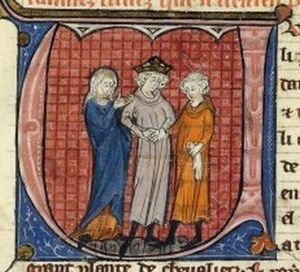
Conrad of Wittelsbach, the Archbishop of Mainz, suggested that Aimery should become king of Jerusalem. Since Aimery's first wife had died, he could marry Isabella I of Jerusalem, who was the queen. Even though some church leaders had doubts, Aimery accepted the offer. He and Isabella were crowned king and queen in Tyre in January 1198.
Aimery ruled his two kingdoms separately, but the Cypriot army helped the Kingdom of Jerusalem. Before his coronation, Aimery joined forces with German crusaders to fight the Ayyubid troops. They forced Al-Adil to retreat and captured Beirut in October. They tried to capture Toron, but the German crusaders left to return home after hearing that Emperor Henry VI had died.
In March 1198, four German knights attacked Aimery in Tyre. His guards saved him. Aimery accused Raoul of Saint Omer of hiring the attackers and banished him. The High Court of Jerusalem said Aimery's banishment was unlawful. Still, Raoul left the kingdom because he knew Aimery was unhappy with him.
Aimery signed a peace agreement with Al-Adil in July 1198. This agreement secured the coast from Acre to Antioch for the crusaders for over five years. The Byzantine emperor, Alexios III Angelos, wanted to take back Cyprus. He asked Pope Innocent III to excommunicate Aimery so he could invade, but the Pope refused.
Aimery kept the peace with the Muslims. In 1202, some French crusaders wanted him to attack the Muslims, but Aimery explained that he needed more soldiers. An Egyptian leader took a fortress near Sidon and raided nearby areas. When Al-Adil could not stop him, Aimery's fleet captured 20 Egyptian ships and attacked Al-Adil's land. In return, Al-Adil's son attacked the region of Acre. In 1204, Aimery's fleet attacked a town in Egypt. Aimery and Al-Adil signed a new peace agreement for six years in September 1204. Al-Adil gave Jaffa and Ramleh to the Kingdom of Jerusalem. He also made it easier for Christian pilgrims to visit Jerusalem and Nazareth.
Aimery became very sick after eating too much fish. He died on April 1, 1205. His six-year-old son, Hugh I, became king of Cyprus. His wife, Isabella, continued to rule the Kingdom of Jerusalem.
Aimery's Legacy
Aimery was seen as a strong and smart ruler. His time as king brought peace and stability to his lands. He started to update the laws of the Kingdom of Jerusalem to make clear the king's powers. Lawyers of the time thought highly of him. One lawyer, John of Ibelin, said that Aimery ruled both Cyprus and Jerusalem "well and wisely" until his death.
Family
Aimery's first wife was Eschiva of Ibelin. They had five children:
- Bourgogne, who married twice.
- Helvis, who married Raymond-Roupen, Prince of Antioch.
- Guy, who died young.
- John, who died young.
- Hugh I, who became King of Cyprus after Aimery.
Aimery's second wife was Isabella I of Jerusalem. They had three children:
- Sybilla, who married Leo I, King of Armenia.
- Melisende, who married Bohemond IV of Antioch.
- Amalric, who died as a child.
See also
 In Spanish: Emerico de Chipre para niños
In Spanish: Emerico de Chipre para niños
 | William L. Dawson |
 | W. E. B. Du Bois |
 | Harry Belafonte |


